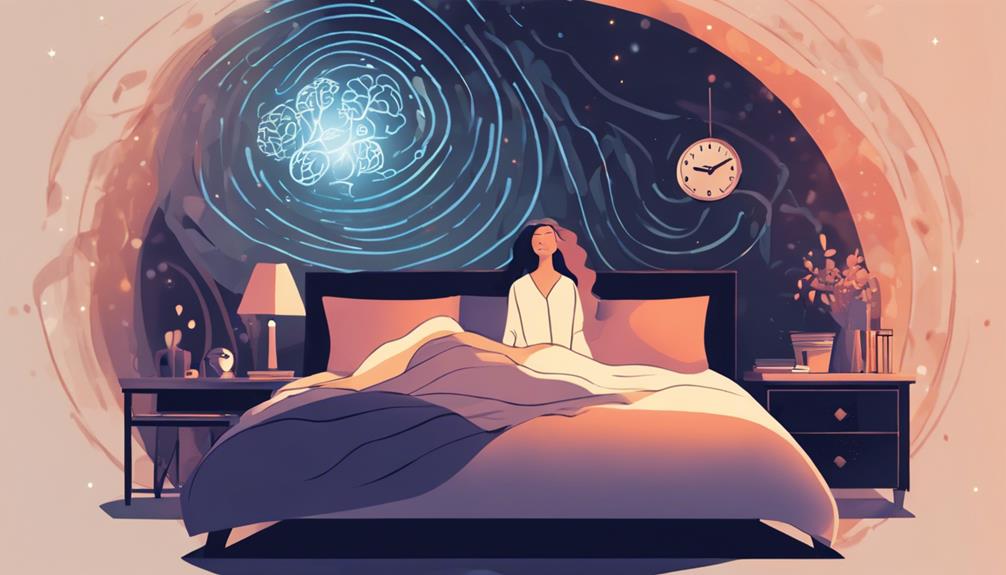Health hypnosis significantly improves sleep quality by enhancing the mind-body connection, inducing relaxation, and targeting psychological factors affecting sleep. Various studies support its efficacy in improving sleep duration and depth, along with positive outcomes in diverse patient groups. Hypnosis promotes restful sleep patterns, reduced stress levels, and sustained improvements in sleep quality. Through relaxation techniques, stress reduction, and promoting mental wellness, health hypnosis can be integrated into daily routines to cultivate inner peace and clarity. The profound impact of health hypnosis on sleep quality is evidenced by its ability to address both physical and psychological aspects for enhanced rest and well-being.
Benefits of Health Hypnosis for Sleep

The benefits of health hypnosis for improving sleep quality have been supported by various studies and clinical trials, demonstrating its potential as a non-invasive intervention for sleep disorders.
Cognitive benefits associated with health hypnosis include enhanced cognitive functioning, improved concentration, and better memory retention. By addressing the underlying psychological factors contributing to poor sleep, such as racing thoughts or anxiety, health hypnosis can help individuals achieve a calmer mental state conducive to quality sleep.
Moreover, stress reduction is a key component of how health hypnosis can positively impact sleep quality. Through relaxation techniques and guided imagery, hypnosis can aid in lowering cortisol levels, reducing muscle tension, and promoting overall relaxation. By alleviating stress, individuals may experience an easier transition into sleep and a more restful night's rest.
Mechanisms Behind Improved Sleep Quality
Research has elucidated the intricate mechanisms through which health hypnosis contributes to the enhancement of sleep quality. One key mechanism is the mind-body connection that hypnosis helps strengthen. By guiding individuals into a state of deep relaxation and heightened focus, hypnosis can positively influence the mind-body connection, reducing stress and anxiety levels that often disrupt sleep.
Through relaxation techniques such as controlled breathing and visualization, hypnosis can calm the nervous system, lower heart rate, and decrease muscle tension, creating optimal conditions for falling asleep and staying asleep throughout the night.
Additionally, hypnosis can target underlying psychological factors contributing to poor sleep, such as racing thoughts or unresolved emotions. By addressing these issues during hypnotherapy sessions, individuals can experience emotional release, mental clarity, and a sense of inner peace, all of which are conducive to improved sleep quality.
Research Evidence Supporting Hypnosis for Sleep

Numerous empirical studies have demonstrated the efficacy of hypnosis in improving sleep quality. The clinical effectiveness of hypnosis in addressing sleep disorders has been supported by research showing positive outcomes in various patient populations. These studies have delved into the impact of hypnosis on brain activity during sleep, indicating significant improvements in sleep patterns following hypnotherapeutic interventions.
Research exploring the long-term effects of hypnosis on sleep quality has shown promising results. By influencing brain activity related to sleep cycles, hypnosis has been found to promote more restful and efficient sleep patterns over extended periods.
This suggests that the benefits of hypnosis for sleep extend beyond immediate effects, potentially offering sustained improvements in overall sleep quality.
Practical Applications for Better Sleep
Studies have identified practical applications of hypnosis that can contribute to improving sleep quality in individuals experiencing sleep disorders. One key practical application is stress reduction.
Hypnosis techniques, such as guided imagery and progressive muscle relaxation, can help individuals manage and reduce stress levels before bedtime, promoting a more restful night's sleep. By inducing a state of deep relaxation, hypnosis can calm the mind and body, making it easier for individuals to fall asleep and stay asleep throughout the night.
Furthermore, hypnosis emphasizes the mind-body connection, which is crucial for enhancing sleep quality. Through hypnosis, individuals can learn to tune into their body's signals, understand the impact of thoughts and emotions on sleep, and develop a greater awareness of the mind-body relationship. This heightened awareness can lead to improved sleep hygiene practices and a more balanced lifestyle, ultimately supporting better sleep patterns.
Integrating Health Hypnosis Into Sleep Routine

Exploring the incorporation of health hypnosis techniques into one's nightly routine can offer a proactive approach to enhancing sleep quality and addressing sleep disorders. By integrating relaxation techniques commonly used in health hypnosis, individuals can create a conducive environment for improved sleep. These techniques, such as guided imagery and progressive muscle relaxation, work to calm the mind and body, preparing them for a restful night's sleep.
Incorporating health hypnosis into a sleep routine can also have a positive impact on mental wellness. The practice of hypnosis promotes a state of deep relaxation, reducing stress and anxiety levels that are often barriers to quality sleep. By engaging in hypnosis before bedtime, individuals can cultivate a sense of inner peace and mental clarity, setting the stage for a more rejuvenating sleep experience.
Frequently Asked Questions
Can Health Hypnosis for Sleep Help With Insomnia in the Long Term?
When considering the long-term benefits of health hypnosis for sleep, it is essential to analyze its impact on sleep patterns and effectiveness in addressing insomnia. Research on sustained effects and efficacy is crucial for informed recommendations.
Are There Any Potential Side Effects of Using Health Hypnosis for Sleep?
When considering the safety concerns of using health hypnosis for sleep, it is essential to review efficacy studies to understand potential side effects comprehensively. Proper evaluation and monitoring are crucial to ensure the practice's effectiveness and safety.
How Often Should One Practice Health Hypnosis for Optimal Sleep Benefits?
In determining the frequency of health hypnosis practice for optimal sleep benefits, individuals should consider the research supporting its health benefits. Consistent practice, tailored to individual needs, may enhance sleep quality significantly.
Can Health Hypnosis Be Used in Combination With Other Sleep Aids?
When considering the use of hypnosis in combination with other sleep aids, it's essential to consult healthcare providers. Integrating hypnosis with medication or therapy may offer complementary benefits, but tailored guidance is crucial for safe and effective outcomes.
Is Health Hypnosis for Sleep Suitable for Individuals With Mental Health Conditions?
Considering mental health conditions, it is essential to assess patient suitability for health hypnosis for sleep. Evaluating effectiveness alongside potential risks is crucial. Tailoring interventions to individual needs and monitoring outcomes can optimize benefits.
Conclusion
In conclusion, the impact of health hypnosis on sleep quality is supported by research indicating its benefits in improving various aspects of sleep, such as reducing insomnia symptoms and enhancing overall sleep quality.
The mechanisms behind these improvements are believed to involve relaxation, suggestion, and cognitive restructuring.
Incorporating health hypnosis into one's sleep routine may offer a promising approach for individuals seeking to enhance their sleep quality and overall well-being.
